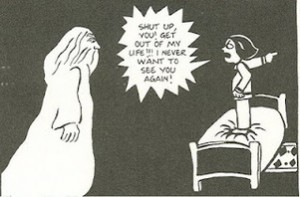I recently finished reading “Perspolis”, by Marjane Satrapi, upon finishing it I was left with a unique perspective on the Iranian youth. Persepolis is a graphic narrative that tackles the topic of being a kid in the midst of a revolution, and the rise of Islamic fundamentalism. Persepolis stands out to me and resonates because of Satrapis honesty. She recalls her youth in a way that is incredibly relatable and bold. She humanizes what it is like to grow up in the midst of a revolution. She introduces aspects of life that affect kids all over the world, and relates them to her experiences.
Every one wants to think that their parents are the coolest, the toughest, the most heroic, but in privileged western society that looks very different. Over here that might mean that your dad can build a cool treehouse for you, or that your mom is an above average skier. These things, seemingly, mean so much to us, and it’s the same way for Satrapi. But for her, she compares her family to others in the midst of a revolution. She has to compete with her friends over who’s parent has suffered more at the hands of the Shah, who has experienced more torture, who has taken more risks. She feels disappointed that her father is merely a protestor with a keen eye for justice and what the right thing to do is. It’s not until pg. 54, when she meets her uncle Anoosh, that she feels real familial pride.
Scenes like these make relating to “Persepolis” an entirely realistic experience. Nothing else that I have
read on the Iranian Revolution and the rise of Islamic fundamentalism has given me such a fresh perspective.
Satrapi accomplishes her goal brilliantly of trying to show a fresh perspective on the middle eastern conflicts and religion. The way that she talks about religion is incredibly mature and advanced, but spoken through the words of a young woman make it seem as if it is such a simple topic. The way that she illustrates the abandonment of God, and how she feels as if his help is useless. On pg . 70 Satrapi exclaims at God: “Shut up, you! Get out of my life!!! I never want to see you again!”. There is a redefinition of religion for Satrapi. She succeeds in showing the spectrum of emotion and frustration towards religion in an entirely childish way, but at the same time also in a very advanced way. The dialogue and emotions are ones that people of all ages can relate to, but the critique and questioning of God is something that most people do not do until they are much older.
. 70 Satrapi exclaims at God: “Shut up, you! Get out of my life!!! I never want to see you again!”. There is a redefinition of religion for Satrapi. She succeeds in showing the spectrum of emotion and frustration towards religion in an entirely childish way, but at the same time also in a very advanced way. The dialogue and emotions are ones that people of all ages can relate to, but the critique and questioning of God is something that most people do not do until they are much older.
Satrapi manages to show martyrs in a way that I have never seen before. In some scenes you see her mocking martyrs as if it is a joke (pg. 97), and in other scenes you see her absent-mindedly beating her chest in mourning (pg. 95). Satrapis understanding of the manipulation that the military and government have on the youth is wise and mature.
After reading this I had some thoughts on the spectrum of environments todays youth experience. I wonder, can all kids and teenagers have such a progressive and positive outlook on life if their environment reflects an entirely different outlook? How many kids out there have been shaped negatively by Islamic fundamentalism? How much different would Satrapi’s life look if her parents were not so progressive? All the answers elude me, one thing I do know, however, is that Marjane Satrapi has bravely put out one of the most refreshing and groundbreaking pieces of work that will affect the way that the western world views the middle east.
Thanks for reading,
Isaiah
Sources:
Marjane Satrapi, “The Complete Persepolis”, (2004), pg. 54, 70, 95, 97

This is a really interesting post! It shows great understanding of Persepolis as well as great empathy towards Satrapi and growing up in the pre and post revolutionary Iran as a young child. What was really interesting for me to read, was you comparing how the youth of privileged western society saw their parents as ‘cool’ and what it meant to them and how a Marji saw her family, in particularly Anoosh, as heroic. Overall, it was very interesting for me, coming from a society much similar to the one in Persepolis, to see your interpretation of Satrapi’s work.